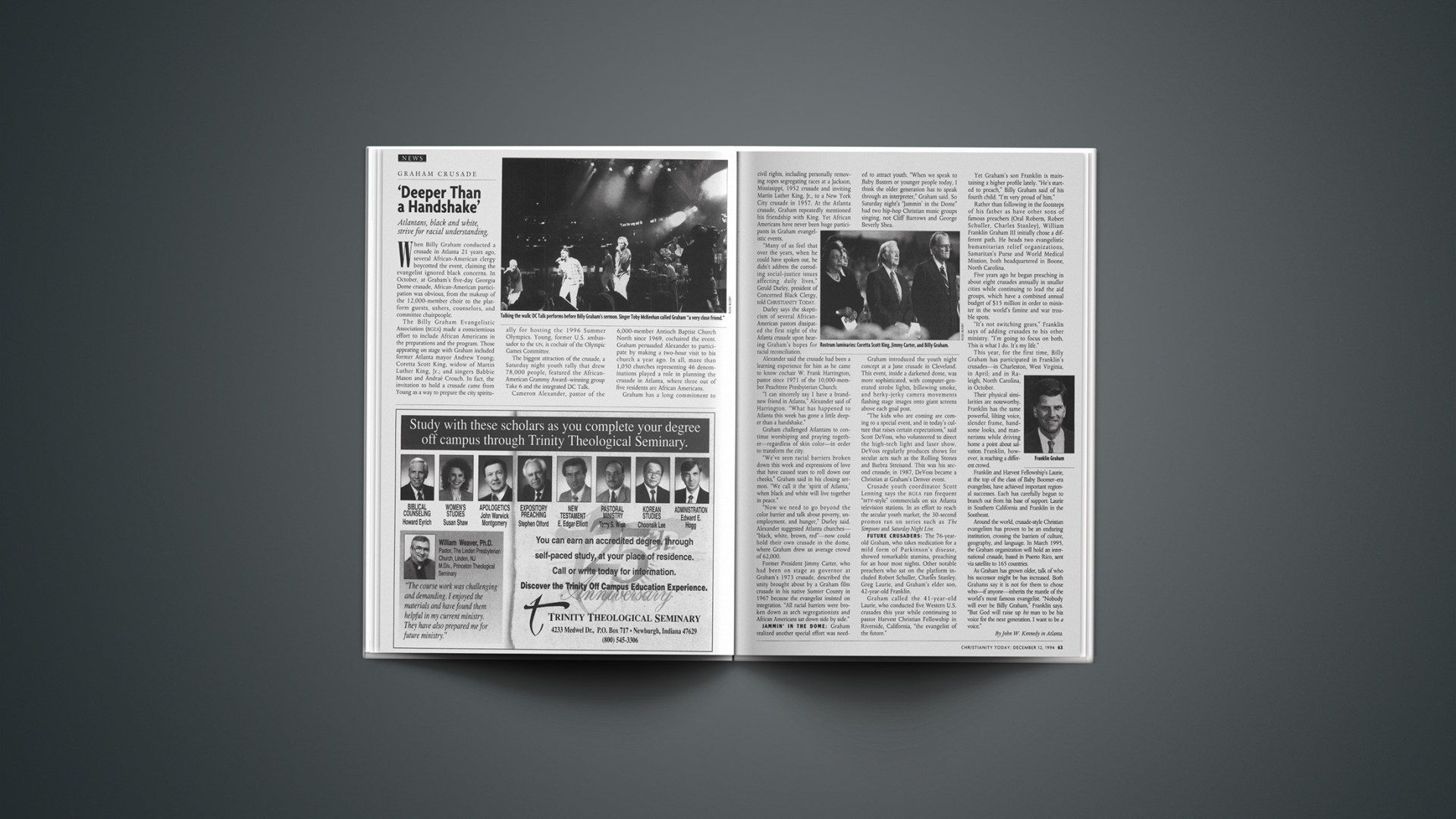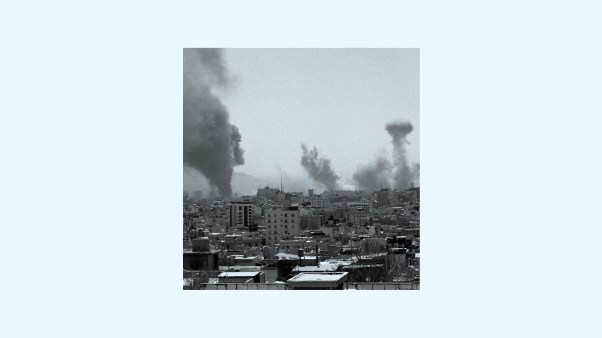When Billy Graham conducted a crusade in Atlanta 21 years ago, several African-American clergy boycotted the event, claiming the evangelist ignored black concerns. In October, at Graham’s five-day Georgia Dome crusade, African-American participation was obvious, from the makeup of the 12,000-member choir to the platform guests, ushers, counselors, and committee chairpeople.
The Billy Graham Evangelistic Association (BGEA) made a conscientious effort to include African Americans in the preparations and the program. Those appearing on stage with Graham included former Atlanta mayor Andrew Young; Coretta Scott King, widow of Martin Luther King, Jr.; and singers Babbie Mason and Andrae Crouch. In fact, the invitation to hold a crusade came from Young as a way to prepare the city spiritually for hosting the 1996 Summer Olympics. Young, former U.S. ambassador to the UN, is cochair of the Olympic Games Committee.
The biggest attraction of the crusade, a Saturday night youth rally that drew 78,000 people, featured the African-American Grammy Award-winning group Take 6 and the integrated DC Talk.
Cameron Alexander, pastor of the 6,000-member Antioch Baptist Church North since 1969, cochaired the event. Graham persuaded Alexander to participate by making a two-hour visit to his church a year ago. In all, more than 1,050 churches representing 46 denominations played a role in planning the crusade in Atlanta, where three out of five residents are African Americans.
Graham has a long commitment to civil rights, including personally removing ropes segregating races at a Jackson, Mississippi, 1952 crusade and inviting Martin Luther King, Jr., to a New York City crusade in 1957. At the Atlanta crusade, Graham repeatedly mentioned his friendship with King. Yet African Americans have never been huge participants in Graham evangelistic events.
“Many of us feel that over the years, when he could have spoken out, he didn’t address the corroding social-justice issues affecting daily lives,” Gerald Durley, president of Concerned Black Clergy, told Christianity Today.
Durley says the skepticism of several African-American pastors dissipated the first night of the Atlanta crusade upon hearing Graham’s hopes for racial reconciliation.
Alexander said the crusade had been a learning experience for him as he came to know cochair W. Frank Harrington, pastor since 1971 of the 10,000-member Peachtree Presbyterian Church.
“I can sincerely say I have a brand-new friend in Atlanta,” Alexander said of Harrington. “What has happened to Atlanta this week has gone a little deeper than a handshake.”
Graham challenged Atlantans to continue worshiping and praying together – regardless of skin color – in order to transform the city.
“We’ve seen racial barriers broken down this week and expressions of love that have caused tears to roll down our cheeks,” Graham said in his closing sermon. “We call it the ‘spirit of Atlanta,’ when black and white will live together in peace.”
“Now we need to go beyond the color barrier and talk about poverty, unemployment, and hunger,” Durley said. Alexander suggested Atlanta churches – “black, white, brown, red” – now could hold their own crusade in the dome, where Graham drew an average crowd of 62,000.
Former President Jimmy Carter, who had been on stage as governor at Graham’s 1973 crusade, described the unity brought about by a Graham film crusade in his native Sumter County in 1967 because the evangelist insisted on integration. “All racial barriers were broken down as arch segregationists and African Americans sat down side by side.”
Jammin’ in the dome: Graham realized another special effort was needed to attract youth. “When we speak to Baby Busters or younger people today, I think the older generation has to speak through an interpreter,” Graham said. So Saturday night’s “Jammin’ in the Dome” had two hip-hop Christian music groups singing, not Cliff Barrows and George Beverly Shea.
Graham introduced the youth night concept at a June crusade in Cleveland. This event, inside a darkened dome, was more sophisticated, with computer-generated strobe lights, billowing smoke, and herky-jerky camera movements flashing stage images onto giant screens above each goal post.
“The kids who are coming are coming to a special event, and in today’s culture that raises certain expectations,” said Scott DeVoss, who volunteered to direct the high-tech light and laser show. DeVoss regularly produces shows for secular acts such as the Rolling Stones and Barbra Streisand. This was his second crusade; in 1987, DeVoss became a Christian at Graham’s Denver event.
Crusade youth coordinator Scott Lenning says the BGEA ran frequent “MTV-style” commercials on six Atlanta television stations. In an effort to reach the secular youth market, the 30-second promos ran on series such as The Simpsons and Saturday Night Live.
Future crusaders: The 76-year-old Graham, who takes medication for a mild form of Parkinson’s disease, showed remarkable stamina, preaching for an hour most nights. Other notable preachers who sat on the platform included Robert Schuller, Charles Stanley, Greg Laurie, and Graham’s elder son, 42-year-old Franklin.
Graham called the 41-year-old Laurie, who conducted five Western U.S. crusades this year while continuing to pastor Harvest Christian Fellowship in Riverside, California, “the evangelist of the future.”
Yet Graham’s son Franklin is maintaining a higher profile lately. “He’s started to preach,” Billy Graham said of his fourth child. “I’m very proud of him.”
Rather than following in the footsteps of his father as have other sons of famous preachers (Oral Roberts, Robert Schuller, Charles Stanley), William Franklin Graham III initially chose a different path. He heads two evangelistic humanitarian relief organizations, Samaritan’s Purse and World Medical Mission, both headquartered in Boone, North Carolina.
Five years ago he began preaching in about eight crusades annually in smaller cities while continuing to lead the aid groups, which have a combined annual budget of $15 million in order to minister in the world’s famine and war trouble spots.
“It’s not switching gears,” Franklin says of adding crusades to his other ministry. “I’m going to focus on both. This is what I do. It’s my life.”
This year, for the first time, Billy Graham has participated in Franklin’s crusades – in Charleston, West Virginia, in April; and in Raleigh, North Carolina, in October.
Their physical similarities are noteworthy. Franklin has the same powerful, lilting voice, slender frame, handsome looks, and mannerisms while driving home a point about salvation. Franklin, however, is reaching a different crowd.
Franklin and Harvest Fellowship’s Laurie, at the top of the class of Baby Boomer-era evangelists, have achieved important regional successes. Each has carefully begun to branch out from his base of support: Laurie in Southern California and Franklin in the Southeast.
Around the world, crusade-style Christian evangelism has proven to be an enduring institution, crossing the barriers of culture, geography, and language. In March 1995, the Graham organization will hold an international crusade, based in Puerto Rico, sent via satellite to 165 countries.
As Graham has grown older, talk of who his successor might be has increased. Both Grahams say it is not for them to chose who – if anyone – inherits the mantle of the world’s most famous evangelist. “Nobody will ever be Billy Graham,” Franklin says. “But God will raise up his man to be his voice for the next generation. I want to be a voice.”
Copyright © 1994 Christianity Today. Click for reprint information.










